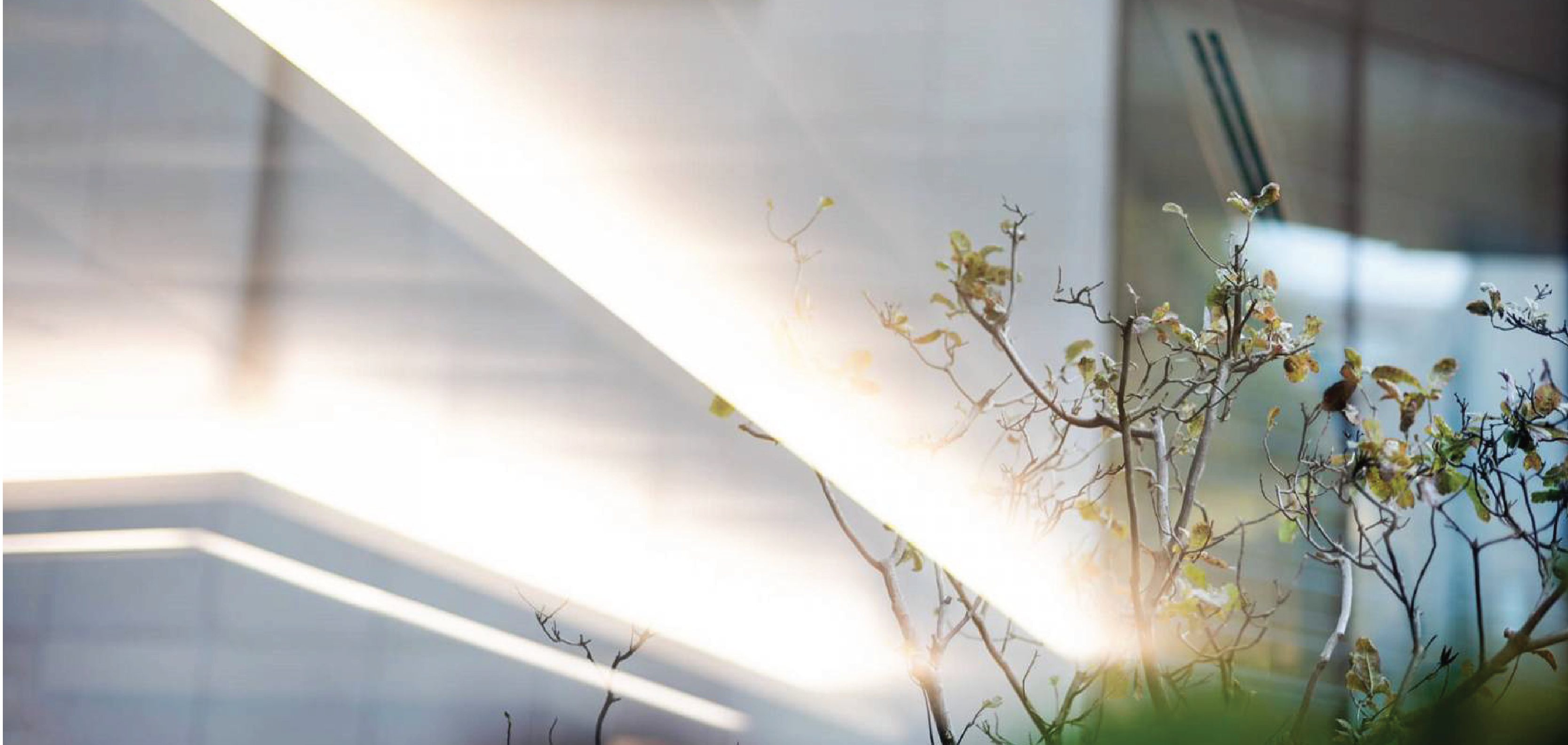Attentive finance
The wellness industry – meditation, yoga, aromatherapy, and so on – has been enjoying a rapid and unexpected boom in recent times. As crises reverberate around the world, the desire to focus on oneself and one’s well-being is spreading and becoming a basic need. Brands are adapting their rhetoric to deliver reassurance. Even the finance industry is softening its messaging and taking customers’ well-being into account.
There's no point in worrying about the future. All the predictions are always dire and shambolic. David Cronenberg

A look ahead to the major trends of the upcoming years and their impact on the financial and economic sector. Produced by Lonsdale’s strategic planning division, with the participation of Luc Rodesch, member of the Executive Committee and Head of Private Banking at Banque de Luxembourg.
The consequences of a crisis are measured on an individual level. Companies typically check a country’s health through the prism of economic criteria and financial scores. But global crises, and especially the efforts to address them, test the resilience of individuals and businesses alike. In addition to economic indicators, there are tools for measuring a population’s mental health. Recurring financial and public health turmoil on a major scale creates a climate of dread and increases people’s stress levels. With nearly 40% of households in G7 countries reporting a decline in income as a result of the pandemic, uncertainty about the future is fuelling multiple fears and impacting psychological health.
Significantly, this year the WHO recognised psychological wellbeing as a key factor in an individual’s overall health. Financial anxiety, which has increased in the current economic climate, remains the most common source of anxiety and can have serious health implications.
Since money has always been seen as a stress factor, can finances and well-being go together? How can banks assuage households’ deep-seated fears and anxieties? Is universal financial well-being possible?
Household morale
Stress knows no borders. Almost 80% of Belgians¹ say they are worried about their finances. More than 60% of French² people admit they are stressed when they think about money. And 25% of Americans report they've had sleep disorders since the sub-prime crisis. This stress, which can impair cognitive functions, is also observed in young people: 51% of Generation Z³ members are afraid that financial crises will prevent them from having the life they want while 43% fear they will never have enough money to be happy.⁴ Clearly there is a correlation between economic crises and increased psychological problems and anxiety. As global events become more alarming, collective fear and feelings of uncertainty are crippling financial activity and prompting households to behave cautiously. Saving is turning into a safe investment that helps prepare for the unknown, easing stress but slowing down consumption and yields.
Cortisol
As an integral part of our lives, money can be a constant source of stress – and not just for the poor. Macro-economic conditions, the health of the stock markets and even geopolitical issues all have an impact on financial peace of mind and give rise to fears of losing financial capital, which has often been built up over a lifetime of work. Luc Rodesch, Executive Committee member and Head of Private Banking at Banque de Luxembourg, notes that “money-related worries never go away and in recent times have actually tended to increase. One of the main reasons is historically low interest rates which are forcing investors to turn to riskier equities or investments.” In a changing global context, economic and political instability can be a source of stress. Some governments are even able to go as far as seizing a portion of savings in the event of high indebtedness or a major attack. Luc Rodesch explains: “To preserve investments and reduce client stress, banks must steer clear of anything that is overly complex. That's the main lesson to be learned from previous economic crises.”
Information is now playing a particularly strategic role when it comes to dealing with the external risks that impact investments and can often quell anxiety. However, it requires some restraint. Thinking a lot about money and one’s investments or just checking one’s accounts increases the body’s level of cortisol, the hormone that causes stress. In short, “the more aware we are of the economic value of everything that happens, the higher our cortisol level and the more stressed we become.” At the turn of the century, French sociologist Nicole Aubert warned that “constant connection can turn into an alienation tool,”⁶ plunging us into a world of constant flux that keeps us on high alert.
Constant connection can turn into an alienation tool. Nicole Aubert

Fear of the void
In 2020, 59% of US households said they were more stressed out by the pandemic’s financial impact than by its health impact.⁷ Financial stress rose dramatically when lockdown began and got even worse when it ended. The long-awaited ‘freedom’ brought with it the grim threat of recession, exacerbating the stress of a large portion of the population unable to see a future. The post-lockdown world is emerging as an even more unstable one, triggering plans for large-scale restructuring of society and resulting in the sacrifice of some of its population. The ‘enforced pause’ in most countries’ productive apparatus is without historical precedent and sets in motion an unparalleled and destabilising economic recession.
The 2008 economic crisis was a traumatic experience for a large portion of the population and economists, who failed to predict it. The new crisis of 2020 is like a ‘economic black hole’ that is shaking up the forecasting models and turning the ‘abnormal’ into the new normal. According to the IMF, the public health crisis is hitting low-income households and vulnerable populations especially hard and “threatening to wipe out the significant progress made since the 1990s in reducing global poverty”. Dire reports on social media and mixed messaging from governments confront households with a multitude of risks.
Managing complexity
Banks are taking a responsible and empathetic approach, placing equal importance on their clients’ financial and physical well-being. As Luc Rodesch points out, banking stress often comes from a lack of understanding and control of the situation: “The overall complexity of the financial markets and their instruments can be frightening. When you don't understand something, you become anxious.” Monitoring apps and ‘fun’ services help familiarise the public with the world of finance. For its part, Banque de Luxembourg focuses on informative/educational and easy-to-understand communication that “eschews technical/trading terms”. Learning and hindsight are the best ways to understand, rather than just put up with, the financial forces at work.
To familiarise clients with financial management, some apps offer risk-free ‘micro-investments’ and slow-money transactions that support sustainable causes and make finance available to people with no particular experience in the field. These digital services, which are highly developed in Japan, allow people to invest small sums and develop the ability to anticipate any kind of situation. In the banking world, the unknown is frightening. Luc Rodesch explains: “Stability is fundamental in building confidence. Clients trust their banking adviser if they are always dealing with the same person. It's also important for the adviser to be attentive, i.e. empathetic and even altruistic. They have to find solutions that meet the client’s needs and concerns, rather than just sell products.” The relationship with the adviser can therefore be the best and most natural immunity against stress.
Stability is fundamental in building confidence.Luc Rodesch

Based on these core, salient points, we can devise two scenarios just to see how finance could potentially shield us from anxiety. As in any exercise involving a fictitious scenario, these two proposals combine verified facts and subjective opinions and pit outlook against prediction.
Scenario 1: the protective bank
In this scenario, the black hole will be widespread. The fierceness of the crises and total questioning of the capitalist model have upset the predictive models. To boost growth, governments go back to their former free-market reflexes, leaving the path open for businesses to increase their productivity ‘whatever the cost’. Faced with this anxiety-provoking situation, protective banks get involved in their clients’ daily lives and develop a close, personal and unbiased relationship with them. Efforts to save money are rewarded by regular notifications, while lyrical but thought-provoking messages offer encouragement and put tough times in perspective. As life expectancy increases and centenarians become ubiquitous, banking services change to cover all stages in life, while online tools offer a way of measuring any physical, mental or financial strain clients might suffer. A spike in the ‘stress index’ is dealt with immediately as it may indicate an unforeseen manoeuvre or attempted fraud. Banking experts quickly assess the risks and intervene to ease the situation using voice assistants and domestic robots.
Smart assistants identify stress factors and invite clients to talk about their doubts or misunderstandings and offset their effects. Banking assistants also help compare prices, select the best products and ensure peace of mind. The assistants’ soothing words and the advisers’ kind messages prove their worth and achieve a perfect balance between saving and consumption.
Scenario 2: Wellness therapy
As they get deeper into what now appears to be an inevitable economic crisis, most consumers become cautious and view the global market differently. Instead of excessive consumerism, they champion a new frugality depending on local businesses. Against this backdrop, the ‘second-hand’ market actually becomes one of the safest stocks. A legion of small businesses promotes short supply chains and invests their profits in social and societal initiatives. While finance slows down considerably, it exits the crisis with a level of trust that is higher than ever.
With the ‘sharing’ economy, individuals all past from ‘I’ to ‘we’ and understand that their own well-being depends on that of the community, the main lesson learned from the crises being that risk is first and foremost collective. Banks promote inclusive, community-based strategies. It becomes normal to share accounts with close groups, while apps to help one another financially enjoy resounding success. Every time a friend is helped, rewards are unlocked, allowing the user to support the charity or non-profit of their choice. Links between banks are also strengthened. The relationship is no longer exclusively with the banker but rather is community-based, enabling everyone to enjoy advice and motivational messages from their ‘banking partners’.
In both scenarios, the bank evaluates its involvement and ‘humanises’ its relationships. Messages sent to clients are no longer automatic notifications but messages from a partner. Online tools are always used sparingly so that advantage can be taken of the straightforward partnerships that those very tools make possible. It’s safe to bet that the bank of the future will place even more importance on the human aspect, on listening and, above all, showing empathy. We can also imagine client training allowing them to earn certifications and become informed investors and savers, and investment schools and holiday camps that combine business with pleasure and promote personal development.
Key points
In the face of economic instability and recurring crises, the banker’s role is to help manage complexity transparently and use reporting tools that allow the client to monitor their investments on a day-to-day basis.
Banks’ human, relational and emotional value is their best defence against financial stress, provided advisers agree to be altruistic.
Micro-investments and eco-responsible investments help absorb financial stress and familiarise people with savings and savings tools.
A dedicated website
www.banquedeluxembourg100ans.com has been specially created to mark the Bank’s centenary. The website uncovers 100 years of economic and social history, going back in time and analysing the implications for the future.
1 Ivox study for N26, 2019.
2 CSA survey, 2017.
3 Generation Z refers to individuals born between 1996 and 2010.
4 Survey: Generation Z Keen on Learning about Personal Finance and Credit, Experian, 2019.
2 Audrey Chabal, Le temps c’est de l’argent, Forbes, 2017.
2 Nicole Aubert, Le culte de l’urgence; la société malade du temps, Flammarion, 2003.
7 PwC Survey, 2020.
2 In July, French president Emmanuel Macron used this expression, considered by some to be unfortunate, to stimulate productivity.


